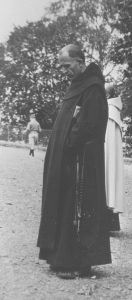As a child Henri Grialou could access the Bible through the readings of the Mass and the catechism. But as he entered the Seminary in order to prepare to become a priest, he had the opportunity to read it personaly and in its entirety. We have the notebooks containing his reading notes. In his meditations on the Bible we can see how he tries to get to know this God who calls him and His mode of action. In one of these meditations, reflecting upon his future mission, he writes about God’s words to Moses and Aaron : « I’ll teach you what you have to do » (Ex 4, 15) : In these special missions, God […] says at every moment what is to be done, and in all difficulties which solution is to be chosen. Moses’ mission is very characteristic of the mode of action of the Divine Providence. (around March 1920)
As a young newly-ordained priest, he enters the noviciate of the Carmelite Fathers in Avon. He walks ahead in the darkness along the path of his vocation; he renounces for a while exercising an attractive ministry. As soon as he gets there, he opens his Bible and comes upon Jesus’ encounter with the Jewish rabbi Nicodemus. One sentence strikes him : « You must be born from above. » (Jn 3, 7). He notes :
At this decisive moment, where his life takes a totally new direction, he hears Jesus’ word which resounds in the Gospel. As a living word, it addresses him today and and gives him confidence by giving him light.
The fruit of his meditating the Holy Scripture in dialogue with life appears through spontaneous remarks on the Gospel scenes which he comments in his preaching. There we have the impression that we enter the scene. For example, when he relates the multiplication of the bread leading to the crowd’s trying to seize Jesus to make him a king (Jn 6,1-15) :
Our Lord flees (…) Probably he takes advantage of the moment when his apostles gather the leftover bread in baskets. (…) This is a trait of Jesus’ behaviour which we must remember : Our Lord flees from the crowd and his disciples in order to retire to the mountain. It must have been a habit which did not surprise the apostles. They respected the liberty Jesus took quite frequently in order to pray, probably to spend the whole night on the montain and to plunge into prayer. In the meantime, the apostles went here and there looking for a place to rest at night, before they met him again the next morning.(20.03.1966).
By pointing to what he calls a typical habit of Jesus, the preacher draws from it the practical lessons for all those who want to be his disciples : his concern for the starving crowds does not prevent him from taking time for prayer, standing apart in the peaceful silence of the falling night.
During the Holy Hours which Fr. Marie-Eugène spent with the community of Notre-Dame de Vie on Holy Thursday in front of the altar of repose he used to medidate aloud on the Gospel. Then he seemed to forget his listeners and entered into a living dialogue with Christ in the Garden of Olives. Jesus’ words became his own words, the words of his prayer :
Therefore what the spiritual master writes in I want to see God comes from a personal experience. His intimate knowledge of Christ is the fruit of an assiduous meditation on Sacred Scripture which nourishes the living dialogue of his prayer and illuminates his life :

